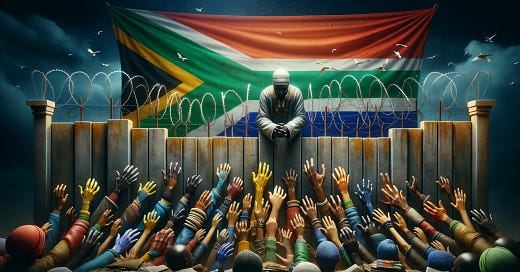On a recent trip to Cape Town, my husband and I spent dozens of hours with both Uber drivers and professional drivers as we toured the surrounding area.
Every one of them was a black African immigrant, variously from Zambia, the Congo, Malawi, Nigeria, etc. They were absolutely incredible exemplars of the classic immigrant work ethic:
One started ten years ago driving Uber in a Toyota he rented by the hour. Ten years later, he was driving a new model Mercedes that he owned while still working 18 hours per day to send money back home. He was glad to be in Cape Town as when he had first arrived in Johannesburg, he saw other African immigrants being killed by South African blacks resentful of the economic competition.
Another had left home 14 years ago to come to South Africa to get a job. He had also left Johannesburg after he saw a much higher risk of being murdered there (the black South Africans in the townships still “necklace” black immigrants, putting a burning tire around their necks to kill them). He now had a family of four in Cape Town and lived in a middle-class suburb. He was going to take his children back home for the first time next Christmas. He had been stabbed once on a train by a thief but survived it. He also told the story of one of his friends, a taxi driver, who had a rider who had him drive to a location, got out of the car, and shot someone, then got back in, ordering him to drive away. After he dropped off the murderous passenger, he went to the police station to report it and was told there was not much they could do. He then discovered that someone at the police station had tipped off the murderer that he had told the police about the murder and he had to relocate his family under emergency conditions in hopes that they would not all be murdered.
He said that killing a human was no bigger deal than killing a chicken.
The others were similar - unbelievably hardworking, conscientious, working long hours to provide for their families both in South Africa and back home, where they were sending money.
At the same time, they were acutely aware that there were many black South Africans who would happily kill them with no scruples about doing so at all.
They were also aware of the lack of work ethic among many black South Africans, about half of whom receive welfare from the state. They were all well-mannered people of faith who remained focused on self-improvement without wallowing in resentment, but it was also clear that they had no respect for the violent, hateful, welfare-indulged locals who were not taking advantage of the employment opportunities that the Black African immigrants were profoundly grateful to have.
As a Black African living in the US, these morally charged anecdotes brought up a striking set of contrasts to common stereotypes in the US:
Many right-leaning people regard black Americans as lazy, and some compare them with older generations of hardworking immigrants from Europe early in the 20th century (the ancestors of many Americans today). These black Africans were just as outrageously hardworking as were any European ancestors of contemporary Americans.
Many right-leaning people regard welfare as leading to dependency and laziness. These black Africans also believed that welfare in South Africa had, indeed, led to dependency and laziness among black South Africans.
What is most interesting to me is how these two right-leaning stereotypes were both validated among entirely black populations. While the black South Africans may still complain about apartheid as a root cause of their problems, black African immigrants had a completely different perspective - one of gratitude for the rich opportunities which did not exist in their nations.
As a black African woman in the US, I’ve long questioned the narrative of “systemic racism” in the U.S.
I’m not claiming it doesn’t exist, but rather that even with whatever elements do exist, compared either to Senegal (my home country) or France (where I was educated and started my career), the US is a land of extraordinary opportunity for black Africans.
Given that the greatest threat to black African immigrants in South Africa are black South Africans (and emphatically not racist whites), it is hard to blame the challenges faced by black African immigrants there on “systemic racism.” Indeed, without exception, the whiter and more right-leaning Cape Town was regarded as safer and more full of opportunity than Johannesburg, where the threats to life from black South Africans were much greater.
The US does have serious racial issues... But the age of giving attention only to those who claim racism is not helping anyone.
South Africa had apartheid, and now has had more than thirty years of black governance. It is an economic basket case.
But for those racists who claim that “see what happens when you let black people rule,” my bet is that if South Africa was ruled by the black African immigrant population, it would be prosperous (they are not allowed to vote, it is exceptionally difficult for them to get citizenship).
They embody the very best of the American work ethic from a century ago. My bet is that every right-wing racist in the US would be impressed by these people - they are more hard-working and conscientious than any of you.
At the same time, the right (both the racist and non-racist right) is correct that welfare dependency does not inspire a work ethic. The black African immigrants are as disgusted by the entitlement of the township black South Africans who live on welfare and whose young men are devoted to violence as is any white nationalist in the US.
What can be done? Both in South Africa and in the US, we need to recognize that pathological behaviors (and virtuous behaviors) are driven by the systems we create.
How do we create systems that bring out the best in people? My bet is that it is closer to a free market system with abundant opportunities than a welfare system in which entitlement attitudes are encouraged.
As a black African, I am SO proud of the heroically hardworking black African immigrants in South Africa.
And I am so disgusted by the opportunists who use political rhetoric to get government favors rather than working together to build a better world.





Anyone who has ever been to impoverished white neighborhoods can tell you it has *nothing* to do with race.
Thank you for the observations, made especially valuable because you understood what you heard and saw.